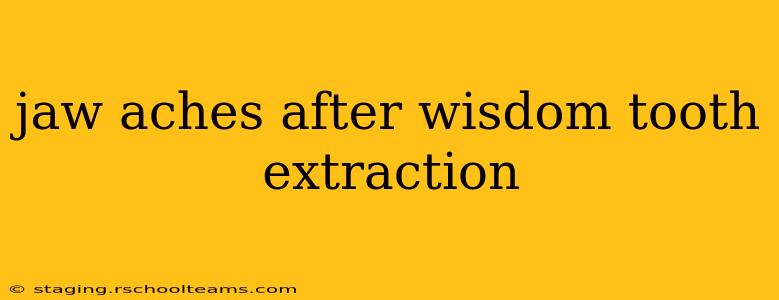Wisdom tooth extraction is a common procedure, but it often leads to post-operative discomfort, including jaw aches. Understanding the causes of this pain, how to manage it, and when to seek professional help is crucial for a smooth recovery. This comprehensive guide will address common concerns and provide valuable insights into managing jaw aches after wisdom tooth extraction.
What Causes Jaw Ache After Wisdom Tooth Extraction?
Jaw pain following wisdom tooth extraction stems from several factors:
-
Surgical Trauma: The extraction process itself involves manipulating tissues and bone, causing inflammation and pain. The more complex the extraction (e.g., impacted wisdom teeth requiring bone removal), the more significant the post-operative jaw ache.
-
Inflammation: Your body's natural inflammatory response to the surgery contributes significantly to pain and swelling. This inflammation peaks around 2-3 days post-surgery and gradually subsides.
-
Muscle Strain: Opening your mouth wide during the procedure can strain the jaw muscles, leading to soreness and stiffness.
-
Nerve Irritation: In some cases, the extraction might cause temporary irritation to nearby nerves, resulting in jaw pain that radiates to other areas of the face. This is usually temporary.
-
Dry Socket: This painful complication occurs when the blood clot protecting the extraction site dislodges, exposing the underlying bone. Dry socket is less common but can cause intense jaw pain and requires immediate dental attention. We'll delve deeper into dry socket later in the article.
How Long Does Jaw Ache Last After Wisdom Tooth Extraction?
The duration of jaw pain varies considerably depending on the complexity of the surgery and individual healing responses. Most people experience significant pain for the first 3-5 days, with a gradual decrease in intensity over the following week. Mild discomfort might persist for several more days or even a couple of weeks.
How to Relieve Jaw Ache After Wisdom Tooth Extraction?
Managing post-operative jaw pain is vital for a comfortable recovery. Here's a multi-pronged approach:
-
Medication: Your dentist will likely prescribe pain relievers, typically NSAIDs (nonsteroidal anti-inflammatory drugs) like ibuprofen, or stronger medications if needed. Follow the prescribed dosage meticulously.
-
Ice Packs: Applying ice packs to the affected area for 15-20 minutes at a time, several times a day, can significantly reduce swelling and pain, especially in the initial 24-48 hours.
-
Rest: Avoid strenuous activities and get plenty of rest. This allows your body to focus its energy on healing.
-
Soft Foods: Stick to a soft food diet for the first few days to minimize irritation of the extraction site. Avoid chewing on the affected side.
-
Gentle Rinsing: Use a saltwater rinse (1/2 teaspoon salt dissolved in 8 ounces of warm water) several times a day to gently clean the area and promote healing. Avoid vigorous rinsing.
-
Over-the-counter pain relievers: If prescribed pain medication is insufficient, consult your dentist before taking additional over-the-counter pain relievers.
What if My Jaw Ache is Severe or Doesn't Improve?
If your jaw pain intensifies, becomes unbearable, or persists beyond a week, contact your dentist immediately. This could indicate a complication like a dry socket or infection.
What is a Dry Socket, and How Can I Prevent It?
A dry socket (alveolar osteitis) is a painful condition that occurs when the blood clot protecting the extraction site is dislodged prematurely. This exposes the underlying bone and nerve endings, causing severe, throbbing pain.
Prevention: Following your dentist's post-operative instructions carefully is crucial in preventing dry socket. This includes avoiding smoking, using a straw, and vigorous rinsing.
Can I Exercise After Wisdom Tooth Extraction?
Strenuous exercise should be avoided for at least a few days after wisdom tooth extraction. Light activity is generally fine, but listen to your body. Avoid anything that might increase bleeding or strain your jaw.
When Should I See a Dentist After Wisdom Tooth Extraction?
Schedule a follow-up appointment with your dentist as instructed. This allows them to monitor your healing progress and address any potential complications. Don't hesitate to contact them earlier if you have any concerns.
This information is intended for general knowledge and informational purposes only, and does not constitute medical advice. Always consult with a qualified dental professional for any health concerns or before making any decisions related to your health or treatment.
